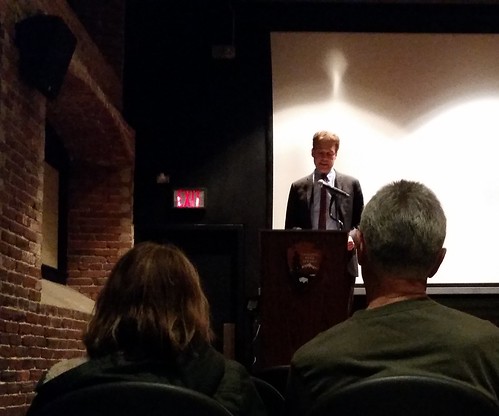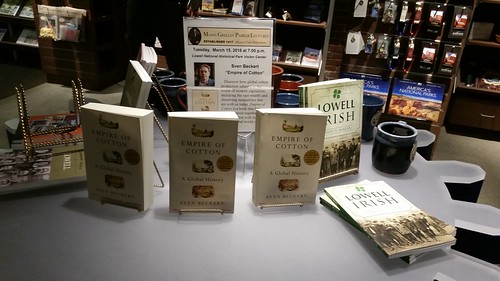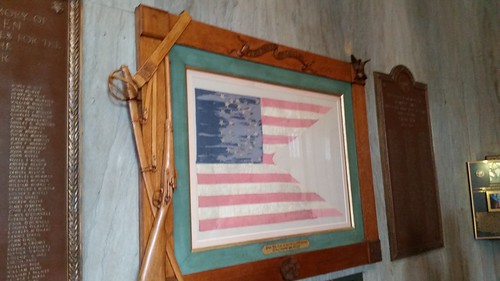Parker Lecture: Empire of Cotton

Sven Beckert at Lowell National Historical Park
Last evening, I joined an overflow crowd at Lowell National Park Visitor Center to hear Harvard history professor Sven Beckert talk about his bestselling book, Empire of Cotton: A Global History (chosen by the New York Times as one of the ten best books of 2015; also a finalist for the Pulitzer Prize) as part of the Moses Greeley Parker Lecture series.
Beckert got off to a good start last night by saying what a great honor it was to present on a book about the global consequences of cotton in Lowell, Massachusetts, saying it was akin to a renaissance scholar giving a talk in Florence. The early part of his talk explained how this book takes a unique approach in the field of history. Most histories focus on the local, regional, or the national, something partly attributable to the emergence of the field of history alongside the development of the nation state. Rarely do histories take a global view and almost never is the subject of history a thing – cotton – rather than an event. Beckert explained that this global approach allows the historian to discover connections that might otherwise be missed, using the term “the unity of the diverse” to illustrate how examining seemingly disparate events and practices around the world is the best way to show their connectedness.
Mentioning that many of his students today have never even seen a working factory, let alone been inside one, Beckert said that the 19th century cotton industry “was a pre-condition to modernity.” Great fortunes made in cotton financed other fields of industrial development. He said that cotton was to the 19th century what oil was (and is) to the 20th and 21st centuries. Like oil, cotton remains important to the global economy.
Although Empire of Cotton covers a 5000 year period from the dawn of civilization to the present day, its primary focus is from 1780 to 1930 when cotton was central to the emergence of industrial capitalism. In fact, Beckert had set out to write a book about capitalism in America but found that focusing on the global cotton industry was the best way to understand the history of capitalism.
In the question and answer period that followed, Beckert shared many interesting insights about the future of cotton, the nature of capitalism, and the place of Lowell in the story. In response to a question from Celeste Bernardo, superintendent of Lowell National Historical Park about how the National Park in Lowell might better present Lowell’s place in the global history of cotton, Beckert said that Lowell already does a good job of presenting the link between cotton manufacturing in the north and slavery in the American south. He said that too often, we in New England focus on this region’s Civil War role in the abolition of slavery while mostly ignoring New England’s very central role in the establishment and immense growth of slavery in America (both in the slave trade and in creating a market for the commodities produced by the slaves). He said that the more we can put Lowell’s story in a global context, the better. Doing that makes the story of Lowell more relevant to our lives today. And Lowell is particularly well-suited to do that since it has experienced both industrialization and de-industrialization, two major forces necessary to understanding the world today.

“Empire of Cotton” for sale at National Park Visitor Center
Empire of Cotton is available for sale at the National Park Visitor Center at 246 Market Street. More information about the book can be found on the author’s website.

Solon Perkins flag
Coincidentally, the next Parker Lecture will be presented by me this coming Sunday, March 20, 2016 at 2 p.m. at the National Park Visitor Center. My topic will be the Solon Perkins flag which has several connections to Empire of Cotton. Perkins is best known for his service as a Union Cavalry officer in the Civil War, an undertaking that cost him his life when he was killed in action in 1863. The men of his unit commemorated his heroic leadership by presenting his mother with the American flag they had carried in battle throughout the war. In the 1920s, the flag found its way to the Lowell Memorial Auditorium where it was displayed in a place of honor. At some point, the flag disappeared and remained lost until 2014 when an auditorium worker re-discovered it in the building’s basement. The Greater Lowell Veterans Council restored the flag and it has since been returned to the Hall of Flags of the Auditorium. While the story of the flag is fascinating in itself, so is Perkins life, both before and during the war. An 1853 graduate of Lowell High School, Perkins immediately went to work for a firm that represented the interests of Lowell’s textile mills in South America. He lived in Argentina for three years and Chile for two, a full participant in Sven Beckert’s global empire of cotton. So please join me on Sunday to hear more about the amazing story of Solon Perkins.